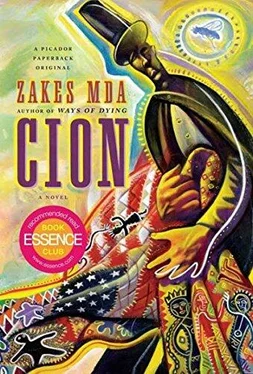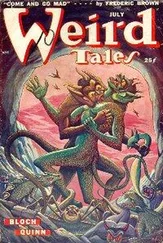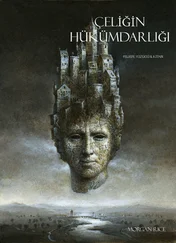The two mounted their horses and escaped. They knew that the abolitionists of Ripley would be up in arms searching for the killers, thinking that they were slave hunters. The two former slaves wept uncontrollably as they fled for their lives from the wrath of the abolitionists.
The killing of William Tobias did not heal the two men’s deep sorrow. Instead it became worse. They spent the remaining days of their lives sitting on the porch brooding about William Tobias. They had killed a man who did not fight back. A man who was kneeling down in prayer.
Orpah. She will never know the things I have done with her in my dreams. In my sleeping and waking hours. In the day and in the night. Throughout the winter months right up to this scented season — the final weeks of spring. Even as I sit on a mound wailing like the wind for the child who is lying in a small white coffin my thoughts are racing up and down the contours of her naked body. It does not help that she is standing across from me in a black dress and black lampshade hat. I have never seen her in a dress before. It makes her look more voluptuous than she really is. She is holding a small bouquet of rambling roses. The serenity on her face is befitting to the occasion.
I try very hard to focus on the business at hand; namely, mourning the child in the coffin. I need to excel myself, for this is the first opportunity I have had in this community to mourn in public. The audience are the relatives of the deceased, which is the same as saying every adult in Kilvert. From the depths of my soul I draw deep and hollow groans, howls, whimpers and moans as rhythmic as they are harrowing. My lamentations are meant to help the grieving relatives who have been numbed by the pain of death come to terms with their sorrow. Through my tears I share their anguish with the rest of the world. For me this is a glorious moment. It’s been a while since I have mourned at a live funeral.
Ruth and Mahlon are here too. He brought a chair for her since she cannot stand for long periods. He dutifully stands behind her. She is in a navy blue dress with yellow flowers and a black and white fur pillbox hat. She has obviously sewn the dress herself and it hangs like a tent on her. He is in a rumpled gray suit, white shirt and a colorful tie with an image of Mickey Mouse. Even on this solemn occasion he has a smile, although it is fainter than usual. He holds a Bible with his left hand and Ruth’s ample shoulder with his right.
I am determined to save Orpah from him.
Even my favorite scoundrel is here. Instead of his usual khaki or denim shorts today he is formal in a blue dress-shirt, a very English tweed jacket, black pants and black brogues: all courtesy of the Kilvert Community Center, as is the case with everyone’s attire here. He would not have missed this funeral for all the beer in Athens. The self-satisfied smile on his face is well earned. He worked very hard to have me as a mourner here today. Sister Naomi, the mother of the deceased, was adamant that she was not going to have a professional mourner at her child’s funeral. Obed went twice to the pokey in Athens where she is awaiting trial to plead with her to let me mourn on her behalf and on behalf of the community. She declined the offer. She claimed that she was a good woman of the church and would not have unchristian practices, even if they were African, at her son’s funeral. Obed went to the other relatives, who gave differing views on the matter. One of them, a certain Ruth Quigley, pooh-poohed the whole idea out of hand. Professional mourning was not in the Bible, she said.
I was not surprised at Ruth’s attitude. She had said as much to me on a few occasions before. It started when she waged a campaign against me for defending and even hiding Orpah’s drawings. She had attacked me for performing heathen practices.
Although I am not an expert on the Bible I know that in my country it was used to oppress and to fight against oppression. It was used to justify apartheid on the one hand, and the liberation struggle on the other — by liberation theologists, for instance. When Obed and I were cracking our heads on how to convince Sister Naomi and her relatives I told him about the usefulness of the Bible in justifying anything you want to justify, and he thought that was the most exciting thing he had heard in a long time. The Bible would come in handy not only for this special occasion of the funeral, but for all his future dealings with his mother. Why, he could even have used the Bible to counter Ruth’s biblical attacks on his hand trembling business!
Obed went to Brother Michael and asked him to search the Bible for any mention of professional mourning. I had also told him that in my quest I had not only learned about the Greeks and the Romans, but had also enriched my own mourning from the practice of Old Egypt where funeral processions pulled by oxen were accompanied by professional mourners hired to wail and gnash their teeth. In today’s world I had learned how the Taiwanese employed professional mourners such as the Filial Daughters Band to wail, scream and create the kind of anguish the weary bereaved were too numb to generate for themselves. I had also been inspired by the children of Israel who, in biblical times, did not only lament and weep bitterly for their dead but employed professional mourners to add more anguish to their sorrow. Even the poorest of families in Old Israel saw fit to engage the services of at least one professional mourner. It was for this reason then that Obed thought Brother Michael as a preacherman of The Word would be the best person to find a passage in the Bible that would justify my wails at the funeral.
The best Brother Michael could come up with was a few words on the burial of a man called Stephen in the Acts of the Apostles 8:2: And devout men carried Stephen to his burial, and made great lamentation over him. This was good enough to take to Sister Naomi, and the fact that it had been Brother Michael who discovered the passage in the Bible convinced her that indeed God did want her to have great lamentation at her son’s funeral. And who was best suited to provide that if not a professional mourner? The sundry cousins and aunts and uncles had to follow suit whether they agreed with this or not. Sister Naomi was the mother, after all, even though it was her irresponsible behavior that led to the death of the child.
When Ruth heard that Brother Michael decreed lamentations would be allowed at the funeral, and that they would be led by the African shaman to whom she had given succor under her roof, she felt betrayed once more. Not so much by Brother Michael, from whom no good could be expected in any event since he was a known adulterer, but by the so-called African shaman who used to be her own African only a few months back. At first she thought she would boycott the funeral. But common sense prevailed. That is why she is here today. And that is why she kept on telling her friends just before the service began that she was only here for the child, who could not be blamed for the foolishness of his mother and of those who professed to be messengers of The Word of God.
Obed had to explain the rudiments of my mourning before Brother Michael took over the service, so that the people did not get the shock of their lives when they saw a strange figure in black top hat, cape and tight pants punctuating hymns and scriptural readings with strange noises. He manufactured some origins for me that dated back to the pharaohs of Egypt. That is why everyone is looking at me in awe as I go full throttle with lamentations that even I did not know were possible.
But the scoundrel did not stop there. In his own Kilvert vernacular he explained to the congregation that every one of them was totally inept at handling grief. That was just how human beings were created. Hence the need for a professional mourner. He reached for his mother’s Bible resting on her lap. Ruth was caught by surprise and at first instinctively held on to her holy book, but soon released it. Her son paged through the good book frantically while everyone looked expectant. He read a paragraph from a letter that St. Paul wrote to the Romans urging them to rejoice with those who rejoiced and weep with those who wept. Then he paged through again until he got to Jeremiah 9:17— Thus says the Lord of hosts: Consider the call for the mourning women that they may come; and send for skillful wailing women, that they may come. Let them make haste and take up wailing for us, that our eyes may run with tears, and our eyelids gush with water .
Читать дальше












